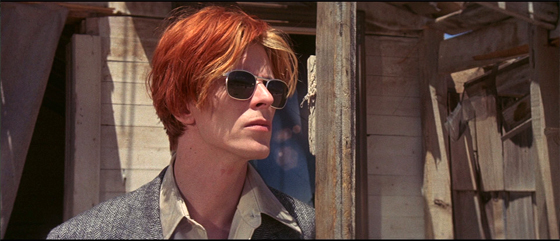Hugely depressing news this morning as the world learned of the passing of David Bowie, just days after his 69th birthday. Bowie was an inspirational and iconic musician, performer and visual artist whose work resonated with millions of people from all walks of life and all parts of the world. His significance was not limited to his music alone, as his public personality and identity encouraged people to be comfortable in their own skin and offered encouragement that it’s OK to be yourself.
I’ve always admired and enjoyed Bowie’s music, especially his more commercial material, but unusually, I’ve always been more of a fan of his films than his music. The ones I have in mind are Labyrinth and The Man Who Fell to Earth. Labyrinth was released a couple of years after I was born. Directed by Jim Henson and starring Bowie as Jareth, the Goblin King, as a child I was enraptured by the film’s visual design and mesmerized by Bowie’s remarkable performance. (It also has a young Jennifer Connelly, of course).
Labyrinth is one of the best depictions of a fantasy world I’ve ever seen, despite (or because of?) its reliance on physical puppets and props rather than CGI. It’s one of those rare films that has stayed with me throughout my life, and its soundtrack is a big part of that, too. I listened to ‘As the world falls down’ after I heard about Bowie’s death this morning and it moved me to tears. A good job I had my office to myself. Here’s a more joyful song from the film which I always enjoy listening to. If I ever have kids, I look forward to being able to introduce them to this movie.
The Man Who Fell to Earth is a remarkable film, and for a while in my early 20s ranked as one of my favourites. Again, the visual design of this film was exceptional, and it’s surely no accident that Bowie had some of his most fruitful cinematic collaborations with visionary filmmakers like Henson and Nicholas Roeg. Bowie’s physical beauty is often remarked upon, and it was particularly apparent in Roeg’s film–at least when he wasn’t in his alien get-up.

The Man Who Fell to Earth had a powerful sense of mystery and poignancy, much of which stems from Bowie’s extremely sensitive performance. It’s a peculiar film in some ways but also a fascinating and moving one and a testament to Bowie’s versatility and subtlety as an actor. If you haven’t seen it then I suggest you check it out.
One of the things about Bowie, with his knack for innovation and constantly changing style, is that different parts of his career can resonate profoundly with different people. One of my other heroes, Arsenal football manager Arsene Wenger, commented on this aspect of Bowie’s personality this morning by saying that to the post-war generation Bowie’s message was “be strong enough to be yourself”. Bowie maintained throughout his life a determined independence and self-reliance that demands respect, but at the same time, his life and work will inevitably be interpreted by individuals in a way that is meaningful to them.
Bowie was from a fairly humble (ie, normal) background and grew up in South London, between Stockwell and Bromley. I grew up just a couple of miles away, a generation later, from a similar class background. Today, with so much of the country’s cultural life being re-appropriated by the wealthy and powerful, to me Bowie’s passing serves as another reminder of that great era of British popular culture of the 1960s-1980s. British music and British comedy both enjoyed a remarkable flourishing in that period, for which there were a number of social and economic factors (including comprehensive education, a diverse economic and industrial base, flourishing trade unions and civil society, and mass immigration). David Bowie was one of a kind, but everyone has the capacity to create and express themselves, and we should live in a world where everyone has that freedom.
Bowie’s cultural influence has been so pervasive and ever-present since my childhood that his death really comes as a shock to me which is out of all proportion to the amount I actually listened to his music. He is one of postwar Britain’s most influential cultural figures, one of the good guys, and it is so sad to see him go.

well done. I’m impressed. Agree on all counts. My first memory of him he was David Jones and sang like Anthony Newley in mid 60s.
South London boy dies in New York aged 69.
LikeLiked by 1 person
I like some of his songs, but like you Labyrinth is what I know him best from. His son is a very talented director.
LikeLiked by 1 person
Interesting, I haven’t seen any of his son’s films to my knowledge. I’ll look them up.
LikeLiked by 1 person